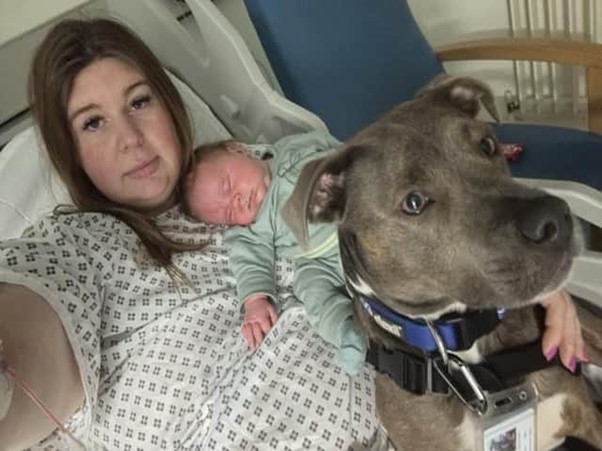Belle the dog proves to be the pawfect birthing partner
Originally published in MK Citizen, 19/06/2023
Meet Belle – the assistance dog who guided her owner through pregnancy, birth and caring for a new baby. Belle is the first dog ever to be allowed on the Labour ward at MK Hospital.
The two-year-old Staffordshire Bull Terrier has this week won a national pet of the year award after judges heard her remarkable story.
Since she was a tiny pup, she has been trained by her owner Amee Tomkins to be an assistance dog, helping Amee deal with her autism, anxiety and panic attacks.

Amee with Olly and Belle immediately after the birth
Loyal Belle has never left her owner’s side, so when 33-year-old Amee fell pregnant after 12 gruelling years of fertility treatment, she knew there was no way she could be pregnant and give birth without Belle.
“Belle helps me in so many ways… She can tell when I’m about to have a panic attack and guides me to the nearest exit. She presses buttons on lifts and she even holds my debit card against the machine to pay for things when we’re shopping.
“Basically, without her, I’m too anxious to leave the house. I’d just stay indoors a day and every day.”
Belle dutifully accompanied her owner to every midwife appointment, every scan and every hospital visit throughout the difficult pregnancy, which was complicated by Amee developing pancreatitis and requiring frequent hospital treatment.
The steadfast staffie was by her side throughout frequent ambulance trips and hospital stays, when doctors allowed her to sleep on Amee’s hospital bed, resting her nose gently on her bump, near her belly button.
“It was as though she was checking the baby’s heartbeat. She even learned to tell the difference between the baby’s heartbeat and my own… It was such a reassurance,.”
As the pregnancy progressed, there were special meetings – with Belle present – with the perinatal team to discuss how the birth would be managed in a way to cause Amee the least stress.
“It was decided a C-Section would be better for my anxiety and autism as I’d know exactly what was happening. Belle was allowed to stay with me before I went went to theatre and we were given our own room so she could stay with me and the baby afterwards. I was really happy with that. There was simply no way I could have done it without her.
“She was the first dog ever to be allowed on the Labour Ward at MK Hospital. It was amazing.”
Baby Olly arrived in the world at a healthy 7lb 7ozs, much to Amee and her partner Paul’s delight.
“As soon as Belle saw him, she gently sniffed him then gave his face a tiny lick to welcome him… Since then she has never left his side,” she said.
“Instead of resting her nose on my bump, she’s switched to putting her nose on the baby’s belly button as though she’s checking his heart and breathing are ok.
“My midwife at the hospital was just fabulous, but having Belle with me is like having another midwife there all the time, to keep me calm and check on myself and Olly.”
For the full story, visit the MK Citizen website.
Frequently asked questions:
Why was the decision taken to allow the dog on the ward?
Under the Equality Act 2010, we seek to undertake and facilitate reasonable adjustments to ensure that all of our patients have the support they need to receive equitable, high quality care. This decision was based on the individual patient’s requirement, with her assistance dog proven to provide comfort and support.
What was in place to ensure safety?
The decision was made in consultation with staff, other patients on the ward and our infection control team, ensuring that all precautions were taken to maintain the safety of everyone on the ward and in the hospital. There was additional support in place to ensure the welfare of the assistance dog while in the hospital.
How were hygiene standards maintained while the dog was on the ward?
Our infection control team were fully aware that the assistance dog was on the ward and as such, put extra cleaning measures in place so that the environment met our stringent cleanliness and hygiene standards.
What specific checks took place before the dog was allowed on ward?
Assistance dogs in hospital environments are not uncommon and we aim to ensure that we make all reasonable adjustments wherever possible for our patients. An each occasion, the risk assessment will consist of discussions with staff, patients and our infection control team to understand the requirements of the patient and what measures needed to be implemented to enable us to deliver safe, personalised care.
Last Modified: 8:55am 04/07/2023
For all media enquiries please contact [email protected]
